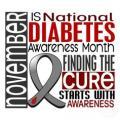Got Diabetes? Click Open the DOC (Diabetes Online Community)
If you take care of your diabetes or you’re the caregiver for a friend or loved one with diabetes you know it’s a demanding 24/7/365 job. From day to day, even hour to hour, there are endless decisions to make to manage the tightrope of glucose control and stay safe. Over the course of a year most people with diabetes (and caregivers) interact just on occasion with their healthcare providers. You manage, or self-manage, your diabetes primarily on your own.
The good news is that over the last decade technology has increasingly allowed people with diabetes (PWD) and their caregivers to connect online. You’re giving and getting support, offering practical advice, sharing the latest research and technology news and much more.
Dialoging about Diabetes: PWDs Offer Ways to Improve Communication and Care #11 Kelly Kunik
 As a diabetes educator/healthcare provider (DHCP) I’m observing that the rapidly growing world of the Diabetes Online Community, the DOC for short, is helping people with diabetes (PWD) and their loved ones find support and feel supported. People and their caregivers are connecting, building relationships and feeling more positive about the challenges of managing their diabetes. I’m delighted to see this trend continue!
As a diabetes educator/healthcare provider (DHCP) I’m observing that the rapidly growing world of the Diabetes Online Community, the DOC for short, is helping people with diabetes (PWD) and their loved ones find support and feel supported. People and their caregivers are connecting, building relationships and feeling more positive about the challenges of managing their diabetes. I’m delighted to see this trend continue!
As a DHCP I’ve long realized that I can’t walk a mile in a PWD shoes. I can’t know what it is like day in, day out to deal with this challenging and relentless disease. But, what I do know is that we can learn from each other to change the dialog between providers and PWD to be more positive, more supportive. Goal one with these Dialoging about Diabetes interviews with diabetes activists is to help make living with diabetes…just a bit easier. Goal two is to enhance the two-way street – to help more PWD connect and encourage more DHCPs to connect PWD to the value of social networking.
Here’s my dialog with Kelly Kunik, who’s lived with type 1 diabetes (T1D) for 38 years as of Halloween 2015, (which was also her parents’ anniversary). She was diagnosed at the age of 8. Kelly notes, “My greatest weakness (my broken pancreas) has become my greatest strength & biggest passion.” Kelly is a Diabetes Advocate, writer, blogger, speaker, humorist, and consultant. She says, “I laugh every day and am passionately spreading the word about living a great life with diabetes.”
Dialoging about Diabetes: PWDs Offer Ways to Improve Communication and Care #9 Kerri Sparling, author Balancing Diabetes and six
 As a diabetes educator/healthcare provider (DHCP) I’m observing that the rapidly growing world of the Diabetes Online Community, the DOC for short, is helping people with diabetes (PWD) and their loved ones find support and feel supported. People and their caregivers are connecting, building relationships and feeling more positive about the challenges of managing their diabetes. I’m delighted to see this trend!
As a diabetes educator/healthcare provider (DHCP) I’m observing that the rapidly growing world of the Diabetes Online Community, the DOC for short, is helping people with diabetes (PWD) and their loved ones find support and feel supported. People and their caregivers are connecting, building relationships and feeling more positive about the challenges of managing their diabetes. I’m delighted to see this trend!
As a DHCP I’ve long realized that I can’t walk a mile in a PWD shoes. I can’t know what it is like day in, day out to deal with this challenging and relentless disease. But, what I do know is that we can learn from each other to change the dialog between providers and PWD to be more positive, more supportive.
Goal one with these Dialoging about Diabetes interviews with diabetes activists is to help make living with diabetes…just a bit easier. Goal two is to enhance the two-way street – to help more PWD get connected and encourage more DHCPs to open the doors of social networking to PWD.
Here’s my dialog with Kerri Sparling, who’s had type 1 diabetes (T1D) for 27 years. Kerri jumped into the diabetes social networking world early on, in May of 2005 with her blog Six Until Me. She regularly contributes her personal thoughts in her column SUM Musings in the D-newsletter diatribe. She’s been an active member of the ever-expanding Diabetes Online Community (aka The DOC) and a diabetes advocate. Now Kerri has authored a book, Balancing Diabetes. Kerri’s book offers her account and the accounts of others, mainly those with T1D, who work to balance diabetes everyday through all the ins and outs of daily life.
Top 10 Take Aways from ADA 2013 – Part Two
 I recently attended the 73rd American Diabetes Association (ADA) Scientific Sessions in Chicago, June 21-25 where brilliant and dedicated researchers and health care professionals from around the globe gather to learn, share and connect. As a diabetes educator involved in the diabetes field nearly 35 years and counting, I was once again wowed by this meeting...and learned a ton!
I recently attended the 73rd American Diabetes Association (ADA) Scientific Sessions in Chicago, June 21-25 where brilliant and dedicated researchers and health care professionals from around the globe gather to learn, share and connect. As a diabetes educator involved in the diabetes field nearly 35 years and counting, I was once again wowed by this meeting...and learned a ton!
Though tough to choose, here are my top 10 take aways from the 2013 ADA meeting - divded into Part One and Part Two:
6. Delivering Improved Diabetes Care and SUPPORT Using Technology: It’s been said before and was said again and again this year, people with diabetes (and prediabetes) need ongoing and consistent support. As Marti Funnell, MS, RN, CDE said, “If we don’t address the emotional side of diabetes we won’t ever improve outcomes. It is an imperative!” And as Ed Fisher, PhD, of Peers for Progress (link) said, “Humans have fundamental need for support and social connections.” People not only need emotional support to manage this disease, but research clearly shows that to make the necessary health behavior changes and implement the management strategies for good control, people also need support. See #10 – The DOC.
The good news is today we have technologies, from Skype, to online systems, to tracking devices, telehealth tools, and more to come in the future, to incorporate important support systems. And numerous studies presented at ADA again showed that people do better with support…and that we can deliver this conveniently to people and more cost effectively.
Out Raising Awareness During American Diabetes Month
 The diabetes stats are downright staggering! Nearly 19 million people are diagnosed with diabetes in the U.S. and another 6 million are estimated to have diabetes but don’t yet know it. Add to this number, another 79 million people with prediabetes yet barely 10 percent of these throngs of people know they have it.
The diabetes stats are downright staggering! Nearly 19 million people are diagnosed with diabetes in the U.S. and another 6 million are estimated to have diabetes but don’t yet know it. Add to this number, another 79 million people with prediabetes yet barely 10 percent of these throngs of people know they have it.
Unfortunately people continue to think of type 2 diabetes as a ho-hum disease and tend not treat it early and aggressively. Yet we know early and aggressive care of type 2 is exactly what keeps people healthier longer. And we know early awareness and action with prediabetes can prevent/delay the progression to type 2 diabetes.
So, to honor American Diabetes Month, I’ve grabbed every opportunity which has come my way to raise awareness, educate and promote action. Check out links to these guest blogs, videos, and interviews:

